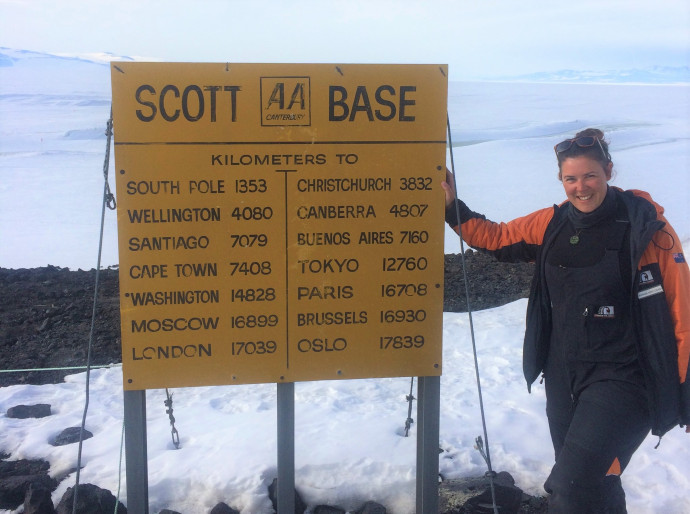2020 Hatherton Award: Using marine sediments to predict New Zealand’s sea level rise

Georgia Grant, GNS Science, has received the Hatherton Award for her paper that reveals the scale and implications for sea level rise in New Zealand from Antarctic ice sheet retreat occurring under 2⁰C warming.
Royal Society Te Apārangi presents this award to the best scientific paper by a PhD student at any New Zealand university studying physical sciences, earth sciences or mathematical and information sciences.
Georgia is a recent Victoria University of Wellington PhD graduate and her research paper ‘The amplitude and origin of sea-level variability during the Pliocene epoch’, was published in the leading science journal Nature. She used a new method of analysing marine geological sediments to construct a global sea-level record for warm climates in the geological past that are similar to those we are projecting for coming centuries.
It showed that Antarctic ice sheets are capable of widespread melting, raising sea-levels under current atmospheric carbon dioxide levels of over 400 parts per million. The research shows approximately one third of Antarctica’s ice sheets melted during the Pliocene epoch around three million years ago, causing sea-levels to rise as much as 25 metres above present levels. Levels of carbon dioxide in the Earth’s atmosphere were similar to today’s levels and in response, temperature was two to three degrees Celsius warmer.
Georgia developed the new method of determining the magnitude of sea-level change as part of her PhD, through analysing the size of particles moved by waves and assemblages of fossilised microscopic shells that lived on the ancient seafloor. The method was applied to the geological archive from the Whanganui Basin on the west coast of New Zealand’s North Island, which contains some of the best evidence anywhere in the world for global sea-level changes. The results were compared to model experiments to determine how changes in sea level at this site related to loss of ice in Antarctica.
Georgia's work was a fundamental breakthrough, as it used a globally unique drill-core record from the Whanganui backcountry that recorded past changes in water depth from marine sediments, now uplifted onto land by tectonic activity. To achieve her results, she developed a method of using changes in sediment grain size (smaller grain size equals deeper water as this setting is less influenced by high energy wave activity), incorporation of microfossil data (ecology of these micro-organisms are dependent on water depth), and numerical modelling methods (mapping how grain size may vary with water depth and different wave climates).
These new sea-level estimates provide a target for testing the results from computer models and improving their ability to make accurate projections of the Antarctic contribution to global sea-level rise, in particular the rates at which the ice sheets can melt in the future.
Her paper has been extremely well received, tracking in the 99th percentile of articles published at the same time and has gained attention from the International Panel on Climate Change.
On receiving the award, Georgia said: "A quick note of thanks firstly to my PhD supervisors, Professor Tim Naish and Dr Gavin Dunbar (my co-authors that brought a breadth of expertise and experience to the publication) Associate Professor Robert McKay for the nomination, and the anonymous recommendations, and finally to my colleagues at the Antarctic Research Centre of Victoria University of Wellington and GNS Science, and the organisations themselves for their ongoing support. My PhD research would not have been possible without funding from the Royal Society of New Zealand’s Marsden Grant and I am very grateful for the capacity of New Zealand to support investigative and impactful science.”
Hatherton Award:
For the best scientific paper by a PhD student at any New Zealand university in physical sciences, earth sciences or mathematical and information sciences.
Citation:
To Georgia Rose Grant for her work on past global sea-level change in response to Antarctic Ice Sheet retreat with implications for sea level rise in New Zealand under 2°C global warming.
Publication details:
Grant, G.R., Naish, T.R., Dunbar, G.B., Stocchi, P., Kominz, M.A., Kamp, P.J.J., Tapia, C.A., McKay, R.M., Levy, R.H., Patterson, M.O. The amplitude and origin of sea-level variability during the Pliocene epoch (2019) Nature, 574, pp. 237-241.
